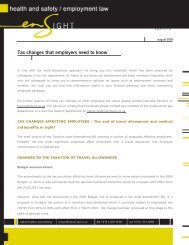The Private Equity Review - ENS
The Private Equity Review - ENS
The Private Equity Review - ENS
- No tags were found...
You also want an ePaper? Increase the reach of your titles
YUMPU automatically turns print PDFs into web optimized ePapers that Google loves.
Investinga related company, trade union representing the employees of the company, or any otherperson who has been granted leave by the court to do so, may serve a demand upon thecompany to commence or continue legal proceedings to protect the legal interests of thecompany and may apply to court for leave to bring or continue proceedings on behalfof the company if the company fails to do so. Furthermore, a shareholder is entitled toinstitute a personal action under common law to enforce its own rights for direct harmdone to it.<strong>The</strong> directors of a company owe fiduciary duties to the company of which theyare directors, and not to the specific shareholders of such company. However, directorsare obliged, in terms of the provisions of the Companies Act, to take cognisance of theinterests of all stakeholders in the company, subject to always acting in the best interestof the company.‘Director’ is defined very widely in the Companies Act, and includes any personoccupying the position of a director (by whatever name designated), such as executiveand non-executive directors, alternate directors, nominee directors, ex officio directors, 12de facto directors 13 and ‘shadow’ directors. 14<strong>The</strong> Companies Act sets out the standards of conduct expected from directors andpartially codifies the common law duties of directors, namely: the duty to act in the bestinterests and for the benefit of the company and not in the interests of any other person;the duty to avoid a conflict of interest; the duty not to exceed their powers; the dutynot to exercise their powers for an improper or collateral purpose; the duty to exercisean unfettered discretion; the duty to act in good faith and promote the best interests ofthe company; and the duty of skill, care and diligence. It is noteworthy, however, thatthe relevant provisions of the Companies Act specifically include references to alternatedirectors and also extend the duties and liabilities referred to in those provisions to12 An ex officio director means a person who holds office as a director of a company as a resultof holding some other office, title, designation or similar status specified in the company’smemorandum of incorporation (‘MOI’). <strong>The</strong> Companies Act states that ex officio directorshave all the duties, and are subject to all the potential liabilities, of any other director of thecompany, irrespective of the company’s MOI.13 <strong>The</strong> duties and liabilities of directors in terms of the Companies Act, as contemplated infootnote 12, are also likely to attach to a de facto director (and to a ‘shadow’ director – seefootnote 14), being a person who has been elected or appointed as a director, but in whoseelection or appointment some defect or irregularity exists, or a person who has not beenformally appointed to the board, or who was previously appointed and has ceased to holdoffice, but who nevertheless takes part in the management of the company and/or is held outas a director. Accordingly, senior managers of a company may be regarded as de facto directors.14 A ‘shadow director’ is considered to be a person who is not formally appointed as a director andwho does not directly participate in management, but in accordance with whose directions orinstructions (whether they extend over the whole or part of the activities of the company) thedirectors of the company are accustomed to act.312





